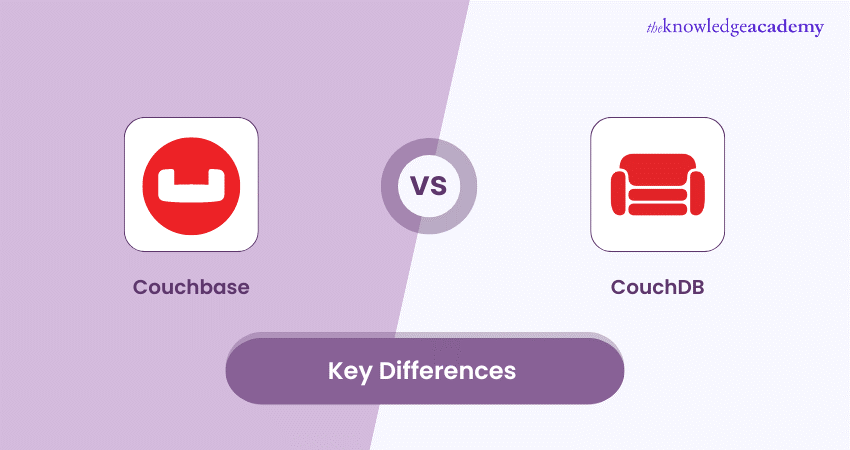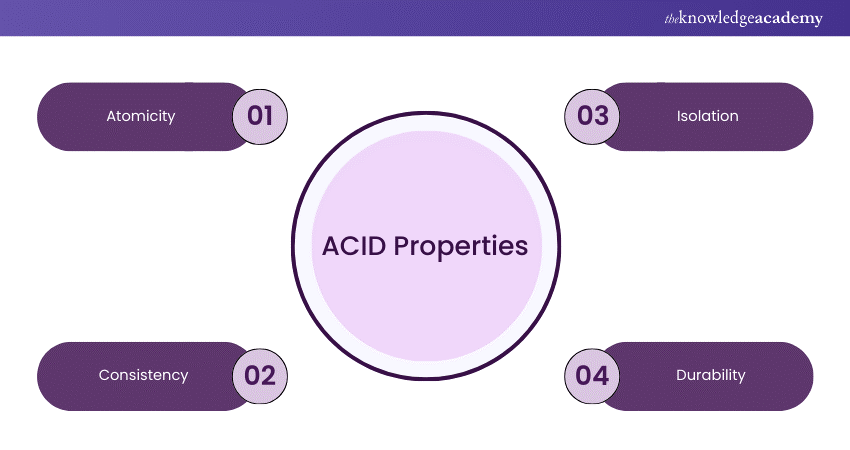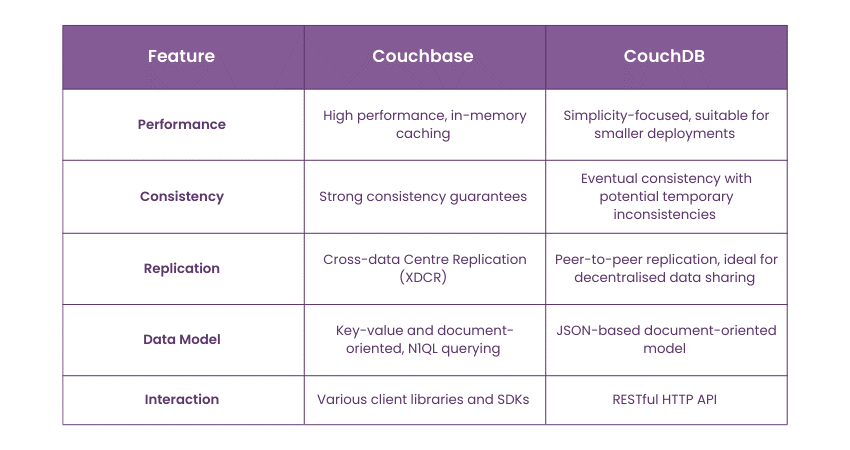We may not have the course you’re looking for. If you enquire or give us a call on + 1-866 272 8822 and speak to our training experts, we may still be able to help with your training requirements.
Training Outcomes Within Your Budget!
We ensure quality, budget-alignment, and timely delivery by our expert instructors.

While selecting the right NoSQL database for your project, a comparison of Couchbase vs CouchDB might emerge as a critical decision point. But do you know what sets them apart? In this insightful blog, we’ll dissect the differences between Couchbase and CouchDB conundrum, providing clarity on their distinct architectures and capabilities.
Couchbase, with its high-performance engine, is tailored for large-scale enterprise applications requiring robust scalability and speed. CouchDB, on the other hand, is ideal for applications that demand reliable data synchronisation.
So, do you wonder how they handle data consistency? Or how can they support your application’s growth? This blog delves into the heart of the matter, highlighting insightful details on Couchbase vs CouchDB. Let’s dive in to unravel the mysteries behind these two powerful databases.
Table of Contents
1) What is Couchbase?
2) What is CouchDB?
3) Major Differences Between Couchbase and CouchDB
a) Performance
b) Consistency
c) Replication
d) Data Model
e) Interaction
f) Use Cases
g) Deployments
h) Core Features
i) Locking Mechanism
j) Caching
k) Integration
l) Query Language
m) In-Memory Capabilities
4) Conclusion
What is Couchbase?
Couchbase Server, formerly Membase, is a versatile, open-source NoSQL database designed for the modern needs of web, mobile, and Internet of Things (IoT) applications. It’s engineered to meet the high concurrency demands of these applications, enabling a multitude of users to simultaneously perform operations like creating, storing, retrieving, manipulating, and displaying data in real-time. Couchbase provides scalable, efficient data access with minimal latency and high throughput, accommodating both key-value and JSON document formats. This flexibility empowers developers to manage data in their preferred manner.
At its heart, Couchbase fuses the strengths of two prominent NoSQL technologies: Membase and CouchDB. Membase, which evolved from Memcached, boosts in-memory caching capabilities by introducing persistence, replication, and sharding features. CouchDB, known for its robust JSON document storage and straightforward RESTful API, simplifies app integration. Consequently, Couchbase delivers a dual advantage: The high performance and scalability of Membase coupled with the document-centric adaptability of CouchDB.
Features of Couchbase
1) Flexible Data Model:
Couchbase stands out with its flexible data model, enabling dynamic, schema-free data storage. It utilises JavaScript Object Notation (JSON) for data representation, allowing manipulation through the SQL++ language (formerly N1QL). It supports both JSON document and key-value storage models, giving developers the freedom to handle diverse and evolving data structures without a predefined schema.
2) Consistent High Performance:
High performance is a hallmark of Couchbase, characterised by consistent throughput and low latency. This is achieved through in-memory caching and optimised data structures, facilitating the simultaneous processing of numerous requests.
Workloads are distributed across servers to sustain performance and minimise bottlenecks, even under significant load, thus enhancing efficiency.
3) Easy Integration:
In terms of integration, Couchbase offers seamless compatibility with a handful of programming languages and tools via Software Development Kits (SDKs) and Client Libraries. These SDKs provide intuitive interfaces for database operations, queries, and index management. Couchbase also supports protocols like Hypertext Transfer Protocol (HTTP)/Representational State Transfer (REST) and Memcached, broadening its applicability across different applications and frameworks.
4) Scalability:
Scalability is another core feature, with Couchbase’s distributed architecture allowing for the addition of nodes as data or workload increases. Data is automatically partitioned across nodes, promoting parallel processing and high throughput. Built-in data replication ensures high availability and fault tolerance, enabling horizontal scaling with minimal latency.
5) Reliability:
Reliability is ensured through Couchbase’s distributed design and data replication. Data is redundantly stored across nodes, providing high availability and resilience against node failures. Cross Datacenter Replication (XDCR) further enhances disaster recovery capabilities by replicating data across geographically dispersed clusters.
6) Full-text Search:
Couchbase’s full-text search capability facilitates efficient and flexible textual content searches within JSON documents. Features include multi-language text analysers, index flexibility, support for multi-field queries, and integration of SQL and search queries. The underlying Bleve open-source engine powers robust search functionalities.
7) Analytics Capabilities:
Couchbase’s analytics capabilities are augmented by a Spark Connector, simplifying integration with Spark SQL. This enables complex data processing and advanced analytics, streamlining workflows and offering real-time insights into operational data. Couchbase is thus well-equipped for modern Data Analysis demands.
Turn into a data-driven decision-maker with our Big Data and Analytics Training – book your spot now!
What is CouchDB?
CouchDB, also known as Couchbase Server, is a versatile, open-source NoSQL database system that is document-oriented and crafted in Erlang. It manages data storage, transfer, and processing across a variety of formats and protocols. CouchDB utilises JSON for data storage, employs JavaScript for its MapReduce query language, and provides an HTTP-based API for interactions.Each document within CouchDB is uniquely identified by an ID (_id) and a revision marker (_rev), which helps in tracking the document’s evolution over time.
Renowned for its adaptability, scalability, and user-friendliness, CouchDB is well-suited for a broad range of applications and scenarios. Its distributed structure enables horizontal scaling and smooth data synchronisation across a cluster’s nodes. Moreover, its RESTful API ensures easy data access and manipulation, offering compatibility with numerous programming languages and environments. Overall, CouchDB stands out as a comprehensive solution for contemporary data storage and management challenges.
Dive deep into Data Analysis, predictive modelling, and machine learning – join our Data Science Analytics Training now!
Features of CouchDB
1) Bi-directional Replication:
CouchDB is adept at bi-directional replication, allowing for the synchronisation of data across various database instances in both directions. This ensures that any alterations in one database are automatically updated across all others, aiding organisations in maintaining data uniformity and accessibility, even amidst intermittent network issues.
Additionally, CouchDB’s inherent conflict resolution system upholds data integrity and consistency when modifications occur simultaneously on different nodes. Bi-directional replication thus enhances system availability, diminishes data recovery durations, and eases backup operations.
2) Views:
Views in CouchDB enable the formulation of tailored queries and indices for efficient data retrieval and analysis. Utilising the MapReduce approach, data is initially mapped into key-value pairs and subsequently reduced to derive results. These views, creatable in JavaScript, are executable within CouchDB itself, thereby streamlining Data Analysis and aiding in the extraction of insights from extensive datasets.
3) HTTP API:
CouchDB leverages HTTP Application Programming Interface (API) REST principles, permitting database access from any location. It employs standard HTTP methods to execute Create, Read, Update and Delete (CRUD) operations, providing a simple yet potent means of database interaction that is both rapid and accessible. This RESTful API facilitates integration with mobile and web applications, ensuring smooth data transactions and manipulations.
4) Document-oriented Model:
The database’s document-oriented model stores data in independent JSON documents, each with a unique ID and comprising key-value pairs. This schema-less methodology affords developers remarkable flexibility, permitting the addition, alteration, and storage of data with diverse structures within the same database.
5) Offline Support:
CouchDB also excels in offline support, automatically synchronising any offline changes with other devices upon reconnection. This feature is foundational for the development of “Offline First” applications, which guarantee uninterrupted functionality regardless of connectivity status.
6) ACID Properties:
Regarding ACID Properties, CouchDB assures data integrity and consistency at the document level. It adheres to an eventual consistency model for distributed data, meaning that while immediate consistency is not assured, data will eventually synchronise across all nodes following a write operation. The ACID properties specific to CouchDB include:

a) Transactions involving multiple operations are either fully executed and committed or not executed at all.
b) Ensures that transactions alter tables exclusively in ways that are both predefined and predictable. Maintaining transactional consistency is crucial to prevent data corruption or errors.
c) Employing a Multi-Version Concurrency Control (MVCC) system, CouchDB allows concurrent document reads without disruptions from other operations.
d) Once committed, data remains intact even in the event of system failures, with CouchDB ensuring complete saves and edits of documents.
7) Compatibility:
Compatibility is another hallmark of CouchDB, as it aligns with a multitude of platforms, languages, protocols, operating systems (including macOS, Windows, and Unix-like systems), and deployment environments. It also supports plugins and extensions, allowing developers to enhance and tailor its features to their specific requirements. CouchDB’s extensive compatibility ensures smooth integration into most existing corporate infrastructures and workflows.
Harness massive datasets and drive actionable insights – join our Big Data Analysis Course now!
Major Differences Between Couchbase and CouchDB
While both are renowned in the realm of NoSQL databases, Couchbase and CouchDB cater to distinct use cases and scenarios. Let's look at the key factors that set them apart:

1) Performance
Couchbase is designed for high performance, with features like in-memory caching and efficient indexing mechanisms. CouchDB, on the other hand, prioritises simplicity and reliability over performance, making it suitable for smaller-scale deployments or applications with less stringent performance requirements.
2) Consistency
Couchbase provides strong consistency guarantees, ensuring that data is always up-to-date across distributed nodes. CouchDB offers eventual consistency, where updates are propagated asynchronously, allowing for faster response times but potentially leading to temporary inconsistencies in distributed data.
3) Replication
Couchbase supports Cross-data Centre Replication (XDCR), enabling automatic synchronisation of data across geographically distributed clusters. CouchDB also supports replication but focuses more on peer-to-peer replication, allowing for decentralised data sharing and offline access in disconnected environments.
4) Data Model
Couchbase uses a key-value and document-oriented data model, allowing for flexible schema design and efficient querying using N1QL (SQL for JSON). CouchDB employs a document-oriented model based on JSON documents, providing simplicity and flexibility in data storage and retrieval.
Transform your career with our Splunk Training - register now to unlock advanced analytics skills!
5) Interaction
Couchbase offers a rich set of client libraries and SDKs for various programming languages, facilitating seamless integration with applications and frameworks. CouchDB provides a RESTful HTTP API for data manipulation, making it easy to interact with databases using standard web protocols.
6) Use Cases
Couchbase is well-suited for high-performance applications requiring real-time analytics, caching, and distributed data processing. CouchDB is often used in scenarios where offline access, data synchronisation, and peer-to-peer replication are critical, such as mobile applications and IoT devices.
7) Deployments
Couchbase is commonly deployed in cloud environments, on-premises data centres, and hybrid infrastructures, offering flexibility in deployment options. CouchDB is lightweight and can be deployed on a single server or in distributed environments, making it suitable for resource-constrained environments or edge computing.
8) Core Features
Couchbase provides features like multi-dimensional scaling, automatic failover, and built-in security mechanisms to ensure high availability and data integrity. CouchDB focuses on simplicity and reliability, with features like built-in conflict resolution, incremental replication, and built-in authentication.
9) Locking Mechanism
Couchbase uses Optimistic Concurrency Control (OCC) to handle concurrent writes, reducing contention and improving performance in distributed environments. CouchDB employs a Multi-version Concurrency Control (MVCC) mechanism, allowing for non-blocking reads and efficient conflict resolution.
10) Caching
Couchbase includes a built-in caching layer that leverages Random-access Memory (RAM) to accelerate data access and improve overall performance. CouchDB relies on disk-based storage but can benefit from external caching solutions or in-memory databases for performance optimisation.
11) Integration
Couchbase integrates with various third-party tools, frameworks, and platforms, including Kubernetes, Kafka, and Spark, to support modern application development and data processing workflows. CouchDB offers seamless integration with web technologies and frameworks, enabling developers to build robust, scalable applications with ease.
12) Query Language
Couchbase provides N1QL (SQL for JSON), a powerful query language that allows developers to perform ad-hoc queries, joins, and aggregations on JSON documents. CouchDB offers a simple map-reduce querying mechanism, allowing for efficient data retrieval and analysis using JavaScript functions.
13) In-Memory Capabilities
Couchbase offers extensive in-memory capabilities, allowing for real-time data processing, caching, and analytics without sacrificing durability or consistency. CouchDB primarily relies on disk-based storage but can leverage caching solutions or in-memory databases for performance enhancement in specific use cases.
Conclusion
Both Couchbase and CouchDB are popular NoSQL databases with distinct features and use cases. While Couchbase excels in high performance, CouchDB shines in scenarios requiring simplicity. Comprehending Couchbase vs CouchDB is crucial for meeting the requirements of your applications and use cases.
Master real-time data processing with our Apache Storm Training – join us and enhance your skill set!
Frequently Asked Questions

The benefit of Couchbase lies in its distributed architecture, offering high scalability, consistent performance, and flexible data models. It's ideal for applications requiring real-time analytics, caching, and distributed data processing.

Couchbase belongs to the category of NoSQL databases, specifically in-memory and document-oriented storage, providing flexibility and scalability for modern applications.

The Knowledge Academy takes global learning to new heights, offering over 30,000 online courses across 490+ locations in 220 countries. This expansive reach ensures accessibility and convenience for learners worldwide.
Alongside our diverse Online Course Catalogue, encompassing 17 major categories, we go the extra mile by providing a plethora of free educational Online Resources like News updates, Blogs, videos, webinars, and interview questions. Tailoring learning experiences further, professionals can maximise value with customisable Course Bundles of TKA.

The Knowledge Academy’s Knowledge Pass, a prepaid voucher, adds another layer of flexibility, allowing course bookings over a 12-month period. Join us on a journey where education knows no bounds.

The Knowledge Academy offers various Big Data and Analytics Trainings, including the Couchbase Training, Apache ORC Training, and ELK Stack Training. These courses cater to different skill levels, providing comprehensive insights into Data Collection.
Our Data, Analytics & AI Blogs cover a range of topics related to Data Analytics, offering valuable resources, best practices, and industry insights. Whether you are a beginner or looking to advance your Data, Analytics & AI skills, The Knowledge Academy's diverse courses and informative blogs have got you covered.
Upcoming Data, Analytics & AI Resources Batches & Dates
Date
 Couchbase Training
Couchbase Training
Fri 17th Jan 2025
Fri 21st Feb 2025
Fri 4th Apr 2025
Fri 6th Jun 2025
Fri 25th Jul 2025
Fri 7th Nov 2025
Fri 26th Dec 2025







 Top Rated Course
Top Rated Course



 If you wish to make any changes to your course, please
If you wish to make any changes to your course, please


